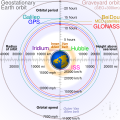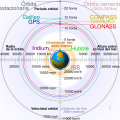File:Comparison satellite navigation orbits.svg
Appearance

Size of this PNG preview of this SVG file: 512 × 512 pixels. Other resolutions: 240 × 240 pixels | 480 × 480 pixels | 768 × 768 pixels | 1,024 × 1,024 pixels | 2,048 × 2,048 pixels.
Original file (SVG file, nominally 512 × 512 pixels, file size: 42 KB)
| This is a featured picture, which means that members of the community have identified it as one of the finest images on the English Wikipedia, adding significantly to its accompanying article. If you have a different image of similar quality, be sure to upload it using the proper free license tag, add it to a relevant article, and nominate it. |
| This image was selected as picture of the day on the English Wikipedia for August 21, 2020. |
File history
Click on a date/time to view the file as it appeared at that time.
| Date/Time | Thumbnail | Dimensions | User | Comment | |
|---|---|---|---|---|---|
| current | 04:48, 27 February 2021 |  | 512 × 512 (42 KB) | Glrx | Fix SVG errors: systemLanguage attr on desc element; misuse of switch element; use SVG 2.0 rules; delete DOCTYPE |
| 14:49, 24 September 2020 |  | 512 × 512 (43 KB) | Drhyme | File uploaded using svgtranslate tool (https://svgtranslate.toolforge.org/). Added translation for ko. | |
| 14:44, 24 September 2020 |  | 512 × 512 (40 KB) | Drhyme | File uploaded using svgtranslate tool (https://svgtranslate.toolforge.org/). Added translation for ko. | |
| 14:35, 24 September 2020 |  | 512 × 512 (36 KB) | Drhyme | File uploaded using svgtranslate tool (https://svgtranslate.toolforge.org/). Added translation for ko. | |
| 19:41, 22 September 2020 |  | 512 × 512 (29 KB) | Cmglee | Reverted to version as of 18:10, 19 August 2020 (UTC) as text is now misaligned and descriptions are removed | |
| 11:31, 21 September 2020 |  | 512 × 512 (23 KB) | Leonel Sohns | Valid SVG. | |
| 18:10, 19 August 2020 |  | 512 × 512 (29 KB) | Ravenpuff | Specify supplementary systemLanguage="en" in switch tags as per Commons guidance | |
| 01:11, 19 August 2020 |  | 512 × 512 (25 KB) | Cmglee | Fix broken hover effects and redundant text. | |
| 17:55, 30 June 2020 |  | 512 × 512 (33 KB) | Galaktos | change http: to https: (except in doctype or xmlns) and wikipedia.org to en.wikipedia.org | |
| 19:43, 23 June 2020 |  | 512 × 512 (33 KB) | Cmglee | Try again |
File usage
The following 45 pages use this file:
- Communications satellite
- GLONASS
- Galileo (satellite navigation)
- Geocentric orbit
- Geostationary orbit
- Global Positioning System
- Graveyard orbit
- List of orbits
- Medium Earth orbit
- Orbital speed
- Satellite navigation
- Space law
- Specific orbital energy
- Van Allen radiation belt
- Talk:Geostationary orbit
- User:Amakuru/POTD 1
- User:Cmglee/2011
- User:Cmglee/drawing
- User:Cmglee/svg
- User:Jamiewang47/sandbox
- User talk:Cmglee/archive2018
- User talk:Cmglee/archive2020
- User talk:Nergaal
- Wikipedia:Featured picture candidates/Earth orbits
- Wikipedia:Featured picture candidates/March-2018
- Wikipedia:Featured pictures/Space/Understanding
- Wikipedia:Featured pictures thumbs/61
- Wikipedia:Main Page history/2020 August 21
- Wikipedia:Picture of the day/August 2020
- Wikipedia:Reference desk/Archives/Science/2013 November 14
- Wikipedia:Reference desk/Archives/Science/2016 June 6
- Wikipedia:Reference desk/Archives/Science/2018 April 12
- Wikipedia:WikiProject Astronomy/Recognized astronomy content
- Wikipedia:WikiProject Astronomy/Recognized content
- Wikipedia:WikiProject Physics
- Wikipedia:WikiProject Physics/Recognized content
- Wikipedia:WikiProject Spaceflight/Downlink/RCWatchlist
- Wikipedia:WikiProject Spaceflight/Recognized content
- Wikipedia:Wikipedia Signpost/2018-04-26/Featured content
- Wikipedia:Wikipedia Signpost/Single/2018-04-26
- Template:Comparison satellite navigation orbits
- Template:Earth orbits
- Template:POTD/2020-08-21
- Portal:Outer space
- Portal:Outer space/Selected picture
Global file usage
The following other wikis use this file:
- Usage on af.wikipedia.org
- Usage on ar.wikipedia.org
- Usage on be.wikipedia.org
- Usage on bg.wikipedia.org
- Usage on bn.wikipedia.org
- Usage on ca.wikipedia.org
- Usage on de.wikipedia.org
- Usage on es.wikipedia.org
- Usage on et.wikipedia.org
- Usage on eu.wikipedia.org
- Usage on fa.wikipedia.org
- Usage on fi.wikipedia.org
- Usage on fr.wikipedia.org
- Global Positioning System
- Système de positionnement par satellites
- Orbite géostationnaire
- Ceinture de Van Allen
- Galileo (système de positionnement)
- Vitesse orbitale
- GLONASS
- Orbite terrestre basse
- Satellite de télécommunications
- Orbite terrestre
- Orbite de rebut
- Orbite terrestre moyenne
- Orbite terrestre haute
- Beidou
- Constellation de satellites
- Modèle:Comparaison des orbites des satellites de navigation
- Usage on ga.wikipedia.org
- Usage on he.wikipedia.org
- Usage on hi.wikipedia.org
- Usage on hr.wikipedia.org
- Usage on hy.wikipedia.org
- Usage on ja.wikipedia.org
- Usage on kw.wikipedia.org
- Usage on lv.wikipedia.org
- Usage on ml.wikipedia.org
View more global usage of this file.








